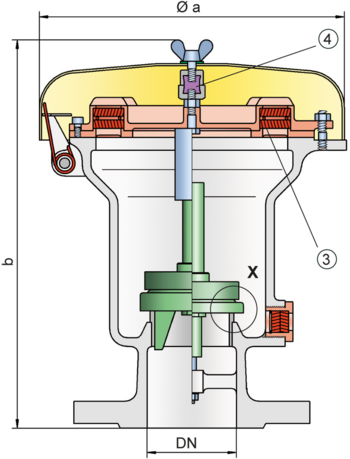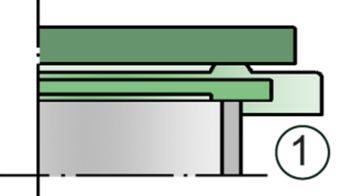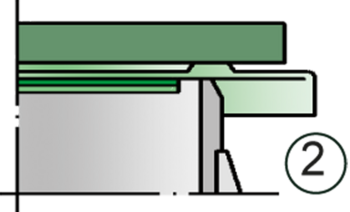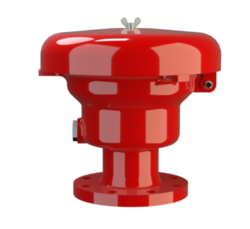P/EBR
Pressure Relief Valve deflagration- and endurance burning-proof
- 10% technology for minimum pressure increase up to full lift (applies to explosion group IIA)
- extreme tightness, resulting in lowest possible product losses and reduced environmental pollution
- due to 10% technology, set pressure is close to opening pressure for optimum pressure maintenance in the system as compared to conventional 40% or 100% technology
- valve opens later and closes earlier than conventional valves
- valve pallet is guided inside the housing to protect against harsh weather conditions
- can be used as protective system in areas with potentially explosive atmospheres in accordance with ATEX
- FLAMEFILTER® provides protection against atmospheric deflagrations and endurance burning
- integrated PROTEGO® flame arrester unit saves space and weight and reduces costs
- PROTEGO® flame arrester unit is protected from clogging and sticky substances caused by product vapors
- minimum pressure loss of the PROTEGO® flame arrester unit
- flameproof condensate drain
- maintenance-friendly design
- modular design enables replacement of individual FLAMEFILTER® discs and valve pallet
Function and Description
The deflagration-proof and endurance burning-proof P/EBR type PROTEGO® valve is a highly developed pressure relief valve for large flows with an integrated flame arrester unit. It is primarily used as a device for flame transmission-proof out-breathing on tanks, containers, and process equipment. The valve offers reliable protection against overpressure and prevents product losses almost up to the set pressure, while at the same time protecting against atmospheric deflagration and endurance burning if stabilized burning occurs. The PROTEGO® flame arrester unit is designed to achieve minimum pressure drop with maximum safety. P/EBR valves are available for substances from explosion groups IIA and IIB3 (NEC group D and C MESG ≥ 0.65 mm).
If the set pressure is reached for a valve approved for explosion Group IIA (NEC group D), the valve starts to open and reaches full lift within 10% overpressure. This unique 10% technology enables a set pressure that is only 10% below the maximum allowable working pressure (MAWP) of the tank. After years of development, this typical opening characteristic of a safety relief valve is now also available for the low pressure range. Valves approved for explosion group IIB3 (NEC group C) function proportionally, so the set pressures should be selected in relation to the proportional behavior (such as a 10%, 40%, or 100% overpressure from the set pressure to the relieving pressure at which the required flow performance is reached).
The tank pressure is maintained up to the set pressure with a tightness that is far above the normal standards due to our stateof- the-art manufacturing technology. This feature is ensured by the valve seats made of high quality stainless steel and with individually lapped valve pallets (1), or with an air cushion seal (2) in conjunction with high quality FEP diaphragm. The valve pallets are also available with a PTFE seal to prevent the valve pallets from sticking when sticky substances are used and to enable the use of corrosive fluids. After the overpressure is released, the valve re-seats and provides a tight seal.
If the set pressure is exceeded, explosive gas/product vapor/air mixtures are released into the atmosphere. If this mixture ignites, the integrated PROTEGO® flame arrester unit (3) prevents flame transmission into the tank. If additional mixture continues to flow and stabilized burning occurs, the integrated flame arrester unit prevents flashback as a result of endurance burning. The valve is protected and also fulfils its function under these severe conditions. The spring-loaded weather hood opens as soon as the melting element (4) melts.
The valve can be used at an operating temperature of up to +60°C / 140°F and meets the requirements of European tank design standard EN 14015 (Appendix L) and ISO 28300 (API 2000).
EU conformity according to the currently valid ATEX directive. Approvals according to other national/international regulations on request.
Dimensions
To select the nominal size (DN), please use the flow capacity chart on the following page
| DN | 80 / 3" | 80 / 3" | 100 / 4" | 100 / 4" |
| DN | 3" | 3" | 4" | 4" |
| Set pressure | ≤ +80 mbar | > +80 mbar | ≤ +80 mbar | > +80 mbar |
| Set pressure | ≤ +32.1 inch W.C. | > +32.1 inch W.C. | ≤ +32.1 inch W.C. | > +32.1 inch W.C. |
| a | 353 | 353 | 353 | 353 |
| b | 345 | 505 | 345 | 505 |
Material selection for housing
| Design | B | C |
| Housing | Steel | Stainless Steel |
| Heating jacket (P / EBR-H-...) | Steel | Stainless Steel |
| Valve seat | Stainless Steel | Stainless Steel |
| Weather hood | Steel | Stainless Steel |
Material combinations of flame arrester unit
| Design | A |
| FLAMEFILTER® cage | Stainless Steel |
| FLAMEFILTER® | Stainless Steel |
| Spacer | Stainless Steel |
Material selection for valve pallet
| Design | A | B | C | D |
| Pressure range [mbar] [inch W.C.] | +3.5 up to +5.0 +1.4 up to +2.0 | >+5.0 up to +14 >+2.0 up to +5.6 | >+14 up to +210 >+5.6 up to +84 | >+14 up to +210 >+5.6 up to +84 |
| Valve pallet | Aluminium | Stainless Steel | Stainless Steel | Stainless Steel |
| Sealing | FEP | FEP | Metal to Metal | PTFE |
Selection of explosion group
| MESG | Expl. Gr. (IEC / CEN) | Gas Group (NEC) |
| > 0,90 mm | IIA | D |
| ≥ 0,65 mm | IIB3 | C |
Flange connection type
| EN 1092-1; Form B1 |
| ASME B16.5 CL 150 R.F. |
Design Types and Specifications
The valve disc is weight-loaded. At set pressure >80 mbar (32.1 inch W.C.), an elongated design is used
There are two different designs:
Pressure relief valve, basic design | P/EBR - – |
Pressure relief valve with heating jacket (max. heating fluid temperature +85°C / 185°F) | P/EBR - H |
Additional special devices available upon request
Settings
| Pressure: | +3.5 mbar | +210 mbar | |
| +1.4 inch W.C. | +84 inch W.C. |
Flow Capacity Chart
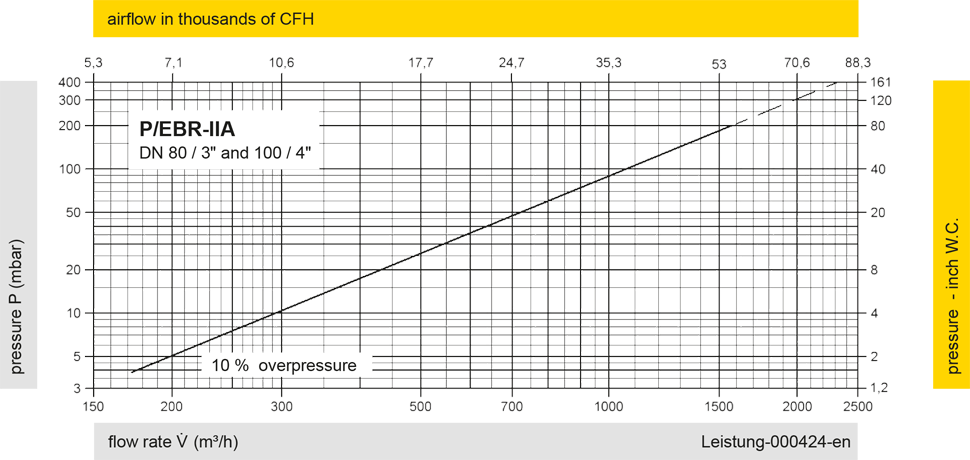
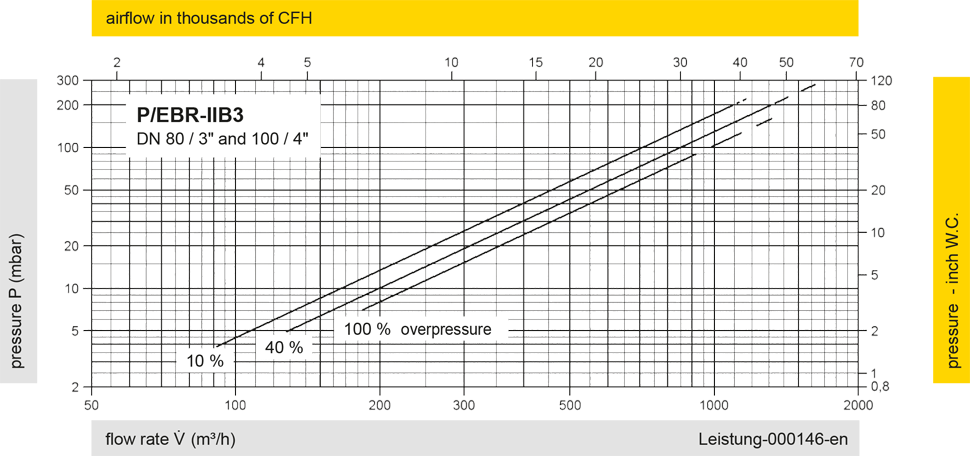

The flow capacity charts have been determined with a calibrated and TÜV certified flow capacity test rig. Volume flow V in (m³/h) and CFH refer to the standard reference conditions of air ISO 6358 (20°C, 1bar). For conversion to other densities and temperatures refer to Sec. 1: “Technical Fundamentals”.
